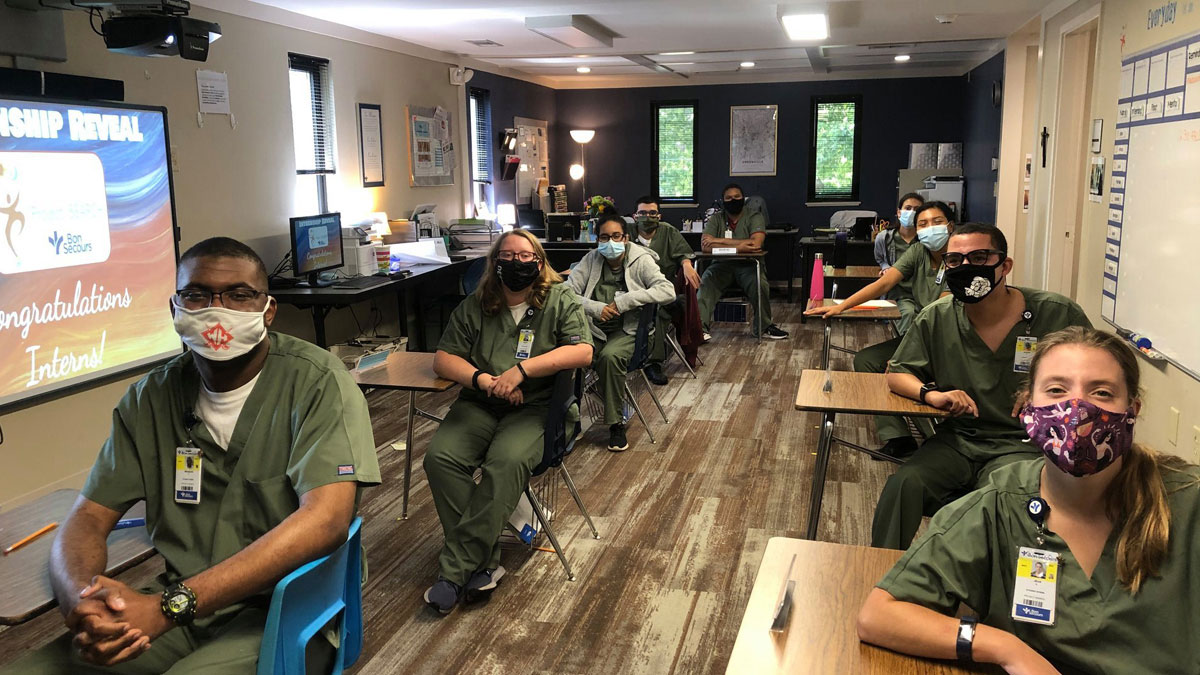“Every day is a joy,” said retired special education teacher Cheryl Johnson of her work with Project SEARCH at Bon Secours St. Francis Hospital in Greenville. As the program’s workforce coordinator, she helps provide specialized vocational training and internships to high school students with a range of intellectual disabilities. Johnson spends her days with student interns, helping them make the “beautiful transition” to being a valued employee in their communities.
Project SEARCH was founded in 1996 by two nurses at the Cincinnati Children’s Hospital Medical Center who noticed that, although they were treating children with a variety of disabilities, they weren’t hiring adults with similar disabilities. They launched Project SEARCH, a comprehensive program in which organizations in medical and hospitality industries partner with local school districts to create an immersive training environment. Students spend time in classrooms, but mostly they work hand-in-hand with mentors at their partner organizations, learning crucial work and life skills through a curriculum focused as much on soft skills and teamwork as on the work itself.
Fast forward two decades, and that pilot program has birthed a movement. Project SEARCH sites sprang up around the country, including the one at Bon Secours St. Francis. Launched in the 2017-2018 school year, its pilot program boasted seven graduates, all of whom went on to find employment at the hospital itself. This wasn’t charity on the part of the medical center; all seven students had proven themselves valuable members of their teams and remain employed today, two years later.
Student interns in Project SEARCH face a variety of disabilities. From autism to hearing or sight impairment, to issues with language and speech, these young adults face numerous and difficult-to-navigate hurdles to meaningful employment. For one, many do not receive an actual state diploma, a requirement for many entry-level positions. Communication and resumé building can be a challenge, but Project SEARCH aims to change that.
Student interns in Greenville start their day by 7:30 a.m. In the classroom, they cover soft skills and talk about the day ahead. From 9 a.m. to 1:45 p.m. they receive on-the-job training with three rotations lasting three months that are completed throughout the school year. There, they learn to take inventory and stock supply rooms and nurses’ stations and to properly clean and sterilize emergency room bays. They learn what goes into EMS supply kits, blood kits and how to navigate complex medical record rooms. These are skills crucial to the proper functioning of all medical centers.
At 2 p.m., all student interns head back to the classroom to reflect upon their days.
Accomplishments are celebrated; setbacks are learning experiences. Johnson oversees all of it.
“Tasks are easy,” she said. “Relationships are harder. Student interns learn to become team players.”
COVID-19 played a role in altering Project SEARCH in the same way it’s affected schools across the country. 2020 graduates missed an internship rotation, and classes were virtual at the start of the school year. The staff was undaunted and remained dedicated to student intern development.
Parents of student interns are grateful.
“Our daughter was eager to find her place in the community,” said Denise Reddy, parent of 2020 graduate Marina Brown. “Through her internship, she learned to be a colleague – a team member. She was treated with dignity and as a professional. She was respected for her abilities. Marina’s confidence has soared.”
Employment after graduation doesn’t have to be at Bon Secours St. Francis. Some students go to other organizations immediately; others find a different path later. Either way, the support of Project SEARCH remains. Nancy Hicks’ son, Thomas, was a 2018 graduate of the program. She said: “Bon Secours and the Project SEARCH team have invested in these young adults, and they care deeply about their continued success in the workplace. Our son felt the need for a job change after working 18 months in his initial hospital department. With guidance and help from Project SEARCH and hospital staff, he was able to transfer departments and maintain his employment in a setting more suitable for him. Project SEARCH paved the way for our son to continue competitive employment for many years to come.”
Johnson concluded, “Many people know someone with a disability. But once you have a colleague who does, you learn quickly to see the ability instead of the disability.”
By Leah Rhyne
